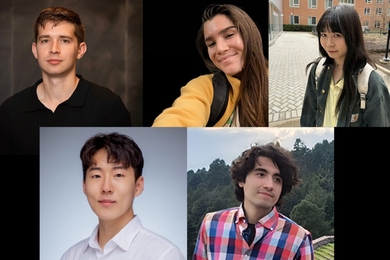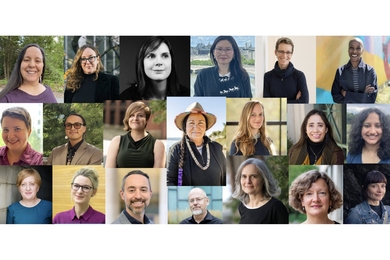The following article was written by Suheil Laher (SB in electrical engineering 1993), MIT's Muslim chaplain.
In the wake of the attack on the World Trade Center and other recent events, much attention has been turned towards Islam. For some, these events perhaps served to perpetuate existing stereotypes of Muslims being terrorists, or of Islam being a religion of violence. It is only fair, though, to go to the sources of Islam to ascertain the true teachings of the religion, and to make a distinction between these teachings and the perceptions obtained from motley data garnered from the media, as well as from the misconduct of a small subset of the religion's followers. This is, therefore, an opportune time for becoming acquainted with Islam - a religion that actually condemns wanton destruction and indiscriminate killing, and has hundreds of followers in the Institute, millions in the U.S., and over a billion worldwide.
Islam is an Arabic word that comes from the same root as the words salima - signifying peace, and aslama, signifying submission. Islam therefore denotes the attainment of peace through submission to the True God. The foundation of Islam is affirmation of belief in and submission to Allah - an Arabic word (related to the Hebrew word Elohim) signifying the One True, Unique God, Originator and Sustainer of the Universe, the Eternal, the All-Knowing, All-Powerful, the Ever-Living, the Self-Subsisting, the Wise, the Granter and Withholder, the Just, the Merciful. The word Allah is genderless, and does not have a plural. Indeed, Islam spurns idolatry and anthropomorphism, insisting that Allah is one, without partner, progeny or equal, and transcendent in essence. Muslims devote their worship to Allah, and try to obey and please Allah in all spheres of their life, out of thankfulness and love, coupled with reverential fear and awe.
Another fundamental Islamic tenet is belief in Prophets, who convey the message of Allah to mankind. Islam teaches that Allah sent numerous prophets to different peoples for different times and places, starting with Adam, including Noah, Abraham, Ishmael, Isaac, Jacob, Moses and Jesus, and ending with Muhammad (peace and blessings be upon them all). Muslims honor all the Prophets of Allah and regard them as role models. Muhammad (peace and blessings be upon him), being the final prophet, is affirmed by the Quran to be sent to all of mankind until the end of the world. The Quran is the Book revealed to Prophet Muhammad, transmitted word-for-word by the Angel Gabriel from Allah. It presents itself as a miracle of style and content - the greatest sign attesting to the veracity of Muhammad. It challenges mankind to produce something comparable to its majestic language, and also offers comprehensive guidance for mankind. The Prophet Muhammad transmitted the Quran to the believers, who memorized and preserved it during his very lifetime. Along with the Quran, the other source of Islamic teaching is the Sunnah or Hadith - a collection of teachings of the Prophet, which, although carrying divine authority, are not necessarily conveyed word-for-word by an angel. Muslims also believe that previous prophets received scripture, but that over time the former scriptures did not remain intact.
Muslims believe in an unending After-Life; that this world as we know it will come to an end, and that all people will then be bodily resurrected - as they were created the first time - and then brought to account for their beliefs, words and deeds, and as a result entered into Heaven or Hell. This belief in the Hereafter, along with the beliefs in Allah, in the Prophets and Scripture, and belief in angels as unseen genderless creatures of light, comprises the major beliefs of Islam.
According to Islamic teachings, the purpose of human life is to live a good life, in obedience to the laws of Allah, having a good connection with Allah, as well as good dealings with people, thereby attaining true happiness in this world, and also preparing for the eternal life. Islam presents guidelines, precepts and moral teachings for the well-being (both worldly and spiritual) of mankind in all spheres of life - religious as well as mundane. However, there are four deeds, which, along with the declaration of belief in Allah and acceptance of the Prophethood of Muhammad, are considered to be 'pillars' of the religion:
1. Salah: Muslims are enjoined to perform a special ritual prayer, preceded by a ceremonial ablution, five times daily. MIT has allocated a special prayer room in W11 to facilitate performance of these prayers.
2. Sawm: Healthy and capable adult Muslims are required to fast - abstaining from food, drink and sexual intercourse between dawn and sunset - during the Muslim month of Ramadan, to develop piety. On campus, the Muslim Students' Association organizes nightly meals during Ramadan to enable Muslims to break their fast with a meal in the company of others.
3. Zakah: Muslims who have over a specified quantity of surplus wealth are required to annually donate a small percentage of it to charitable causes.
4. Hajj: Adult Muslims who are physically and financially capable are required to perform pilgrimage at least once in a lifetime to Makkah - the site of the Ka`bah, the first house of worship on the earth, built by Prophet Abraham. The Ka`bah is also faced by Muslims in salah, and symbolizes unity in faith.
Islam is a religion which places great emphasis on individual responsibility. Exercise of reason is not only encouraged but ordered. The universe reflects the attributes of Allah, while the Quran is the direct word of Allah, and hence a Muslim cannot conceive any contradiction between science and religion; the two go hand-in-hand. Muslims are also expected to contribute positively to their communities and to mankind at large.





